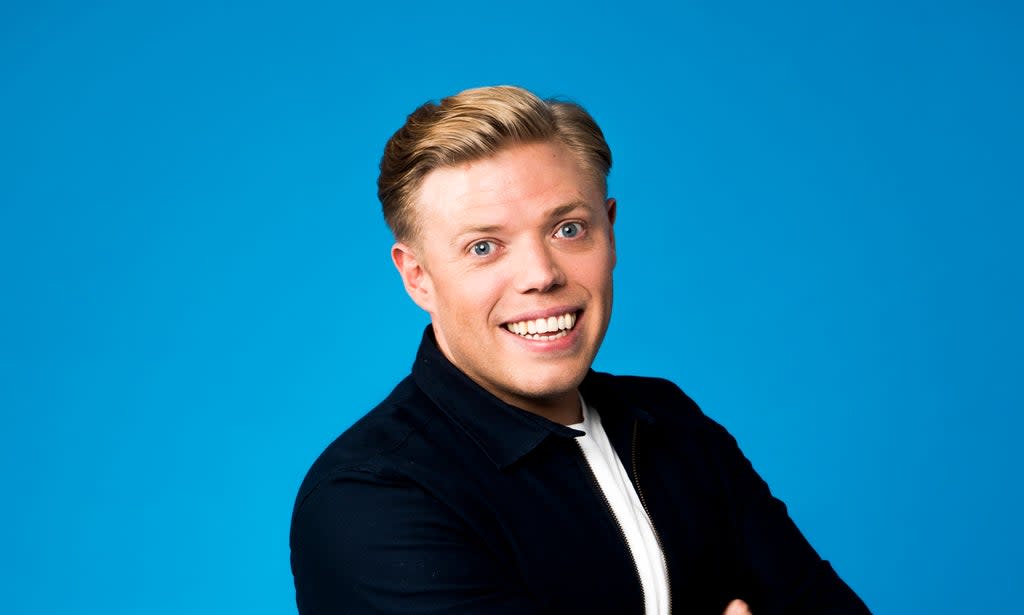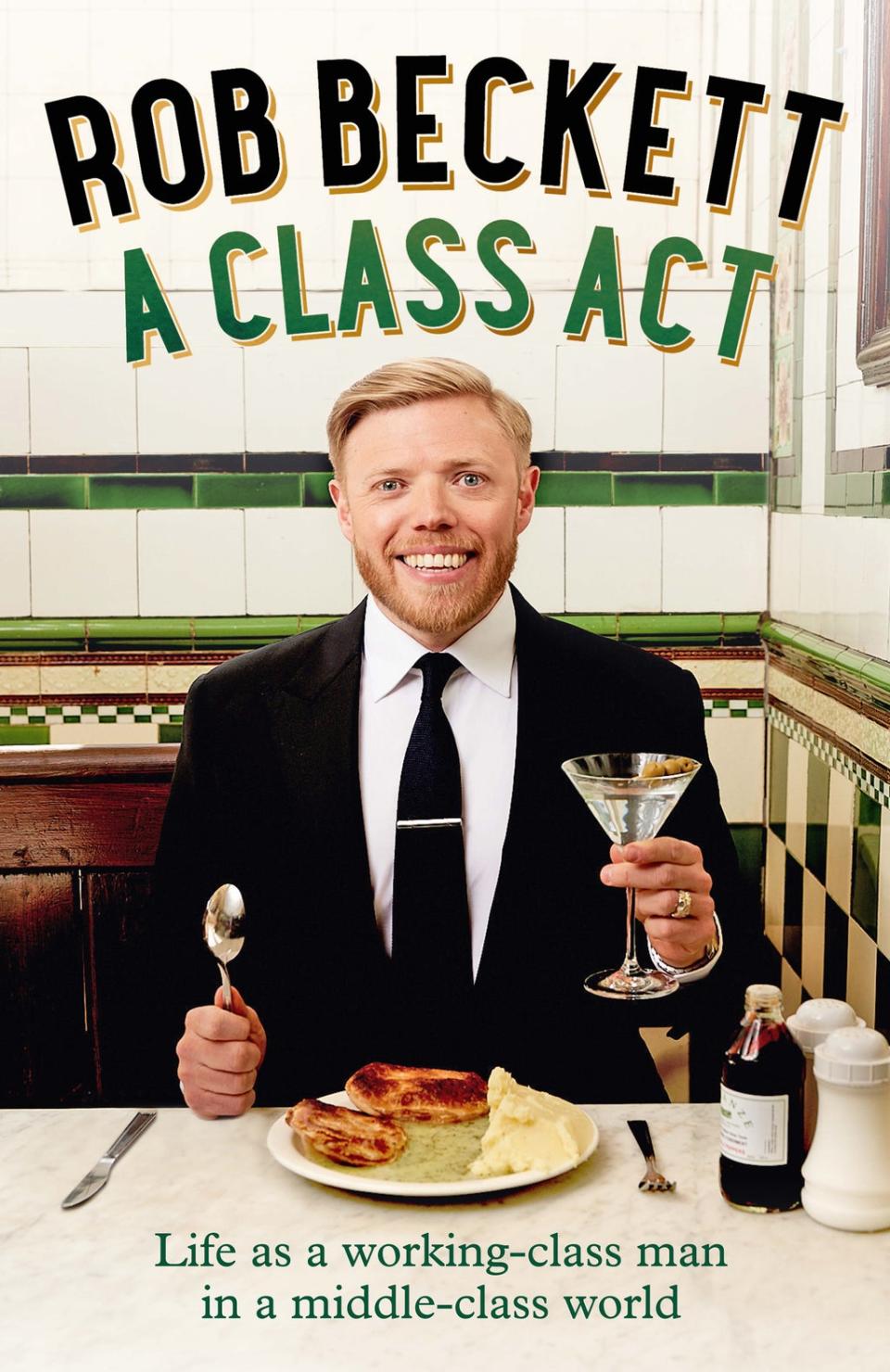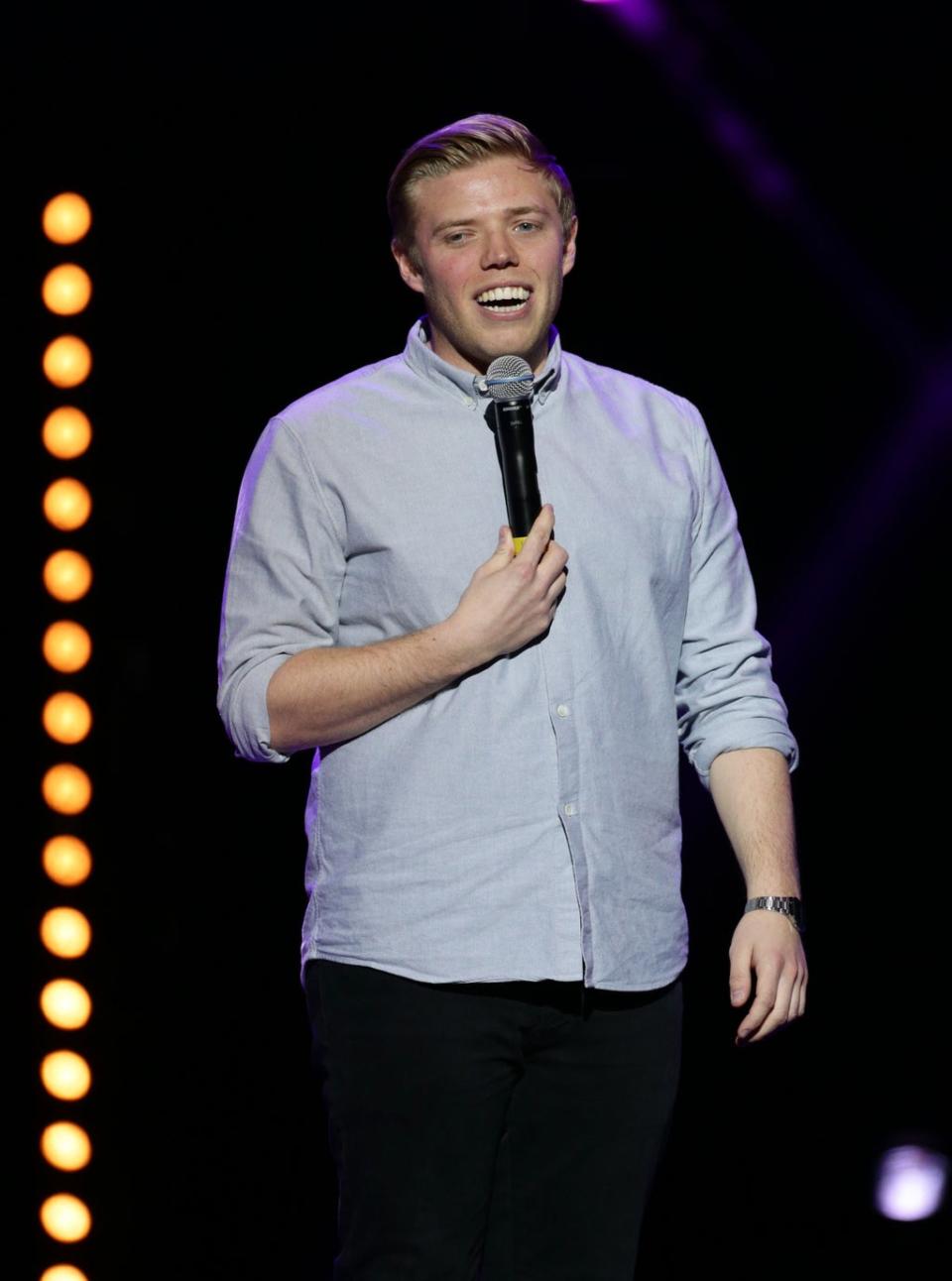Rob Beckett reveals how therapy helped him dodge a breakdown

- Oops!Something went wrong.Please try again later.
- Oops!Something went wrong.Please try again later.
On screen, he’s like on over-enthusiastic puppy wanting to play – yet there is a much deeper side to comedian Rob Beckett the loud, beaming Jack the Lad who joshes on the telly with pal Romesh Ranganathan or talks parenting with Josh Widdicombe on their hit podcast, Parenting Hell.
In fact, his success on TV and on his stand-up tours have masked years of self-doubt and a lack of confidence which, coupled with a huge work schedule, culminated in a near-breakdown just before lockdown last year, he reveals in his memoir, A Class Act.

The frenetic work schedule and his feelings of self doubt came to a head in a hotel room in South Africa in January 2020.
The working class comic had achieved the middle class lifestyle he’d strived for; he’d flown first class to Cape Town to film a TV show – between a nationwide-sell-out tour – he had a happy home life with Lou, the love of his life, and two daughters, ensconced in a newly renovated family home.
“But I was the unhappiest I have ever been,” he writes. “I woke up on January 5 in a five-star hotel room thinking it would be better and easier for everyone if I was dead.”
Today, the 35-year-old blames that meltdown moment on a combination of working too much coupled with severe self-doubt and anxiety.

“I thought I was a confident and well-balanced person, but I wasn’t. I was feeding off that drug of attention and applause and laughter from the gig. You chase it like a drug, but the reality is that being content is what you’re after, which comes from inside.
“I did four or five nights a week of gigging for 10 or 11 years until the pandemic. At the end of all that, because I was working so much and you’ve only got so much energy, you get burnt out.”
As a man from a working class background, the goals he had chased, the wealth, the career success, just hadn’t brought him happiness, he reflects.
“In my head, I thought, ‘Once I’m successful, once I sell out Hammersmith Apollo, once I’ve got a house with a mortgage, I’ll be all right’. I ticked them all off – and then I wasn’t.”
He says he was on the verge of a breakdown, but when he returned from South Africa he spoke to his wife and his manager about his feelings and immediately sought help.

“I did some therapy to calm my brain down. I wouldn’t say I had a breakdown because that would be unfair to people who have had them, but I was definitely heading that way. The timing of getting therapy and the pandemic and my gigs stopping was lucky. It gave me the breathing space that you can’t always take if you’ve got a busy schedule.”
He saw a therapist weekly for eight months and still checks in with him if he feels the darkness return.
He’d had similar feelings years previously when his TV career began to take off, he recalls.
“I started being recognised and that freaked my head out a little bit. I found it very overwhelming. At that point I did therapy on the NHS which helped me to deal with pressure and stress. But it wasn’t as intense as it was more recently.”
The memoir, which hasn’t been ghost-written, explores his life as a working class man in a middle class world and is both funny and thought-provoking, peppered with funny anecdotes and humorous asides about his encounters with ‘posh people’.
It charts his south-east London upbringing as one of five sons whose parents Susan (known as Big Suze) and van-driver-turned-cabbie Dave (aka ‘Jugs’ because of his ‘man boobs’) may, at times, have been short of money but were never short on love.
There are stories of how his working class roots have affected his life as he finds himself in a world of posh people, from the privately-educated comedians at Edinburgh Fringe to Jimmy Carr’s ‘house party’ where Beckett arrived with a blue off-licence bag containing a bottle of tequila (it was a Mexican-themed party) and some cans of lager, only to be shown through the grand house to the garden where the likes of Sir Elton John, Princess Beatrice, Kourtney Kardashian and other A-listers were congregating.
“Never had my working-class roots been so obvious,” he writes. “My blue plastic bag was like a beacon of difference. I might as well have dressed up as a Pearly King and sung ‘Knees Up Mother Brown’ on arrival.”
Today, he chuckles at the thought that he actually kept the bag on him throughout the party, which made a good talking point.
“Just because the situation changes doesn’t mean that you have to,” he says candidly.
The stories are funny, but there is also pathos, given that confidence and self-doubt were always an issue when he was growing up, along with poor body image and a teacher who told a young Beckett that he’d never be a high flier.
“I was a very nervous, awkward child. I learned to be confident. Weirdly, I’ve never really cared what anyone ever thought of me, I’ve only ever really cared of what I thought of myself – and unfortunately I didn’t think much of myself. It was an internalised thing.”
Say hello to me at 16 where I look like a 56 year old car salesman called Keith. For a full explanation of why I look like this buy my book A Class Act. Which is released next Thursday. #AClassAct https://t.co/zikvOIdATb pic.twitter.com/nnsyK9Rd0g
— Rob Beckett (@robbeckettcomic) October 9, 2021
Yet his surroundings always sparked humour.
“I’m from a naturally funny area where everyone growing up was funny. Being working class, so many funny people I knew growing up don’t think they can be a comedian. But my Aunty Tina is funnier than some of the people I’ve done Mock The Week with.”
Now, he’s resumed his sell-out Wallop! tour, postponed due to the pandemic, is hosting the new TV show Undeniable and filming another Rob & Romesh Vs, as well as enjoying regular slots on comedy panel shows. He has more than proved his detractors wrong. To this day, he still doesn’t write any material down. He’ll just say it out loud at a gig and if it goes down well he’ll remember and say it again next time.
Beckett says his naivety about class in the early days protected him from being intimidated.
“I didn’t know what Radio 4 was. I’d never heard of Ken Bruce. Ignorance is bliss. I may not be an academic or know loads about current affairs but I know what’s funny, why it’s funny and how to be funny. That’s all I’m good at.
“The thing about anxiety is that it’s all about the build up. I was oblivious. In the moment, I’m brilliant. You throw me on a stage anywhere and I’ll do well. I’ll work out the room and I’ll be good at what I need to do. However, give me a week in a hotel room to prepare for it, and you’ll see the worst of it.”
Series 4 incoming… who’s excited?! 🤩 #RobRomVs pic.twitter.com/kzdVpurRTq
— Rob & Romesh Vs (@RobAndRomeshVs) October 3, 2021
As for his mental health, lockdown gave him the enforced break he needed from the huge work schedule, he says.
“At the beginning of lockdown I felt I’d lost my identity because I couldn’t gig any more and I couldn’t basically get that drug of self-worth. It was only then that I started to work out what my identity was.”
Things have got better, he continues. “I haven’t got that negative voice in my head all the time now. I have a much more positive voice.”
Despite all this, he still feels his class difference acutely in the world of showbiz.
“When I did the photoshoot for the book cover, the idea was to put me in a pie and mash shop but in a suit that I wore for the Royal Variety Performance and with a martini, to show that jump.
Here’s the link to pre order my book. Signed, unsigned or audio version. https://t.co/laSfK3A7Sr pic.twitter.com/d3hS1B7BcN
— Rob Beckett (@robbeckettcomic) August 17, 2021
“The person involved in that said, ‘Shall we get some shots of you next to a bin?’ I said, ‘No, just because you’re working class doesn’t mean you eat out of bins or you’re rubbish’.
“I get angry but in the past I’ve always swallowed it and not rocked the boat because I was afraid I wouldn’t get booked again. Now I’m more calm. I wouldn’t say I’m more mellow. I’m still loud and mental, but as I’m doing it there’s not a little person in my head saying, ‘You’re s***’.”
A Class Act by Rob Beckett is published by HarperCollins, priced £20. Available now.

